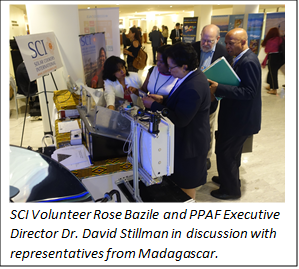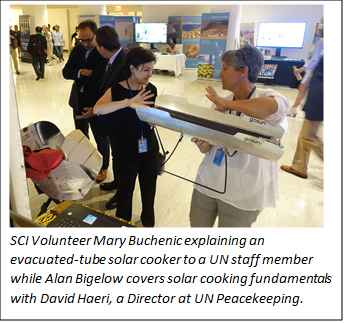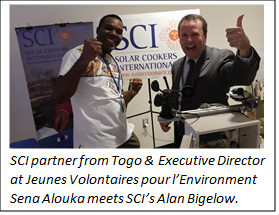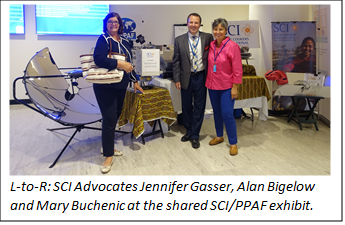SCI Advocacy at the United Nations High-Level Political Forum (HLPF) 2018
Written by SCI Science Director and Main Representative of SCI to the UN Alan Bigelow, Ph.D.

The annual High-Level Political Forum (HLPF) held at the United Nations in New York City each July is one of SCI’s top advocacy opportunities to promote solar cooking. Since 2015, when the United Nations established agenda 2030 and the 17 sustainable development goals (SDGs), the HLPF became the venue where member states deliver their Voluntary National Reviews (VNRs) to report their progress toward accomplishing the SDGs. Solar cooking is a cross-cutting solution that can make a positive impact on all 17 SDGs; hence, SCI prioritizes advocacy at the HLPF to promote solar cooking among policy makers, to encourage member states to include solar cooking in their VNRs, and to connect with high-impact collaborators that can help scale solar cooking worldwide. The theme of HLPF 2018 was "Transformation towards sustainable and resilient societies" and for this year it placed emphasis on the following SDGs, which match well with promoting solar cooking as a clean, sustainable cooking solution:
-
Goal 6. Ensure availability and sustainable management of water and sanitation for all
-
Goal 7. Ensure access to affordable, reliable, sustainable and modern energy for all
-
Goal 11. Make cities and human settlements inclusive, safe, resilient and sustainable
-
Goal 12. Ensure sustainable consumption and production patterns
-
Goal 15. Protect, restore and promote sustainable use of terrestrial ecosystems, sustainably manage forests, combat desertification, and halt and reverse land degradation and halt biodiversity loss
-
Goal 17. Strengthen the means of implementation and revitalize the Global Partnership for Sustainable Development




SCI’s Alan Bigelow being interviewed by UN News (left) and SCI Volunteer Rose Bazile being interviewed by another organization (right). Links to interviews
- https://news.un.org/en/audio/2018/07/1015262 (in English)
- https://www.youtube.com/watch?v=OQF87gbRnIM (in Swahili)
- https://news.un.org/fr/audio/2018/07/1019382?eType=EmailBlastContent&eId=e0441914-5ebb-462c-9afe-0b604fc01f2b (in French)
SCI and collaborator Public-Private Alliance Foundation (PPAF) Executive Director Dr. David Stillman applied for, and were granted, a shared exhibition space for HLPF 2018. The SCI/PPAF exhibition displayed four solar cookers, a test station for SCI’s Performance Evaluation Process (PEP) and showcased the SCI/PPAF partnership efforts in Haiti for clean, sustainable solar cooking solutions. Thanks to SCI volunteers Mary Buchenic, Jennifer Gasser, Jannis Buerger, Ernestina Williams, Peter Gallett, and youth volunteer Arun Raman who joined the SCI advocacy team for this event, our exhibition space was able to greet – and discuss solar cooking with – a steady stream of visitors during the eight-day forum.
SCI’s advocacy team was interviewed by UN News and other organizations, which helped amplify the messaging about the many benefits of solar cooking and the importance of SCI testing solar cookers according to ISO standards. We were eager to spread the news that ISO 19867-1 guidelines for laboratory tests of clean cookstoves were published in June 2018.

Highlights from HLPF 2018 were certainly the hundreds of in-person connections and discussions. Here is a sample list of people we were thrilled to meet with and discuss collaborations for the global solar cooking movement: SCI collaborator from Togo & Executive Director at Jeunes Volontaires pour l’Environment Sena Alouka; SCI’s first UN representative Roma Stibravy; Global Alliance for Clean Cookstoves new CEO Dymphna van der Lans; International Solar Alliance (ISA) Interim Director General Upendra Tripathy and ISA Program Ambassador Mohua Mukherjee; Permanent Mission of Burkina Faso to the UN Second Counselor Honorine Bonkoungou; UN Department of Peacekeeping Operations & Department of Field Support Director David Haeri (who I hadn’t seen since we were in high school); and Anna Lisa Jose at the United Nations Development Programme (UNDP). In many ways, these in-person meetings marked the beginning of important follow-up work to come.